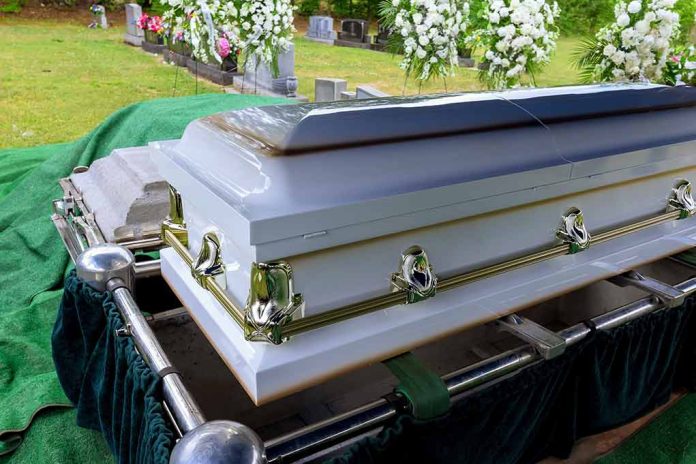🔴 Website 👉 https://u-s-news.com/
Telegram 👉 https://t.me/usnewscom_channel
In a chilling pattern of unexplained deaths, Russian energy executives continue to fall from windows, raising suspicions of foul play and power struggles within Putin’s Russia.
At a Glance
- Mikhail Rogachev, former Yukos vice-president, found dead after falling from Moscow apartment
- Nearly a dozen Russian energy executives have died mysteriously in the past two years
- Deaths often labeled as suicides or accidents, but many suspect assassination
- Pattern extends to critics and enemies of Putin, including opposition leader Alexei Navalny
- Phenomenon dubbed “Sudden Russian Death Syndrome” raises fears of widespread political killings
A Disturbing Trend in Russia’s Energy Sector
The recent death of Mikhail Rogachev, a former vice-president at the oil giant Yukos, marks the latest in a series of mysterious fatalities plaguing Russia’s energy sector. Rogachev’s body was discovered after an alleged fall from his 10th-story Moscow apartment, with authorities quickly labeling it a suicide. This incident adds to a growing list of unexplained deaths among high-ranking executives from major corporations like Gazprom and Lukoil, suggesting a dangerous undercurrent of volatility within Russia’s powerful energy industry.
Mikhail Rogachev, the former vice-president of Yukos, a now-defunct oil and gas company, fell from a window in Moscow, according to Russian media https://t.co/nJKqBrUSRV
— The Times and The Sunday Times (@thetimes) October 20, 2024
The phenomenon has become so prevalent that it’s earned the grim moniker “Sudden Russian Death Syndrome.” This wave of deaths has intensified since Russia’s invasion of Ukraine, raising alarm bells about potential political motivations behind these seemingly accidental demises. The frequency and similarity of these incidents have led many to question whether they are truly coincidental or part of a coordinated effort to eliminate threats to the current power structure.
https://mobile.twitter.com/NBCNews/status/1565826157299306496
The Kremlin’s Shadow Over Business and Politics
The suspicious deaths extend beyond the energy sector, encompassing a wide range of influential figures in Russian society. From businessmen to politicians, the list of those who have met untimely ends under questionable circumstances continues to grow. The case of Ravil Maganov, chairman of Lukoil, who reportedly fell from a hospital window in Moscow, stands out as particularly suspicious given his company’s public opposition to Russia’s war in Ukraine.
This pattern of deaths has not been limited to those directly involved in the energy sector. Critics and perceived enemies of Russian President Vladimir Putin have also fallen victim to mysterious circumstances. The high-profile death of opposition leader Alexei Navalny in a Russian prison, following a previous poisoning attempt with the nerve agent Novichok, underscores the dangers faced by those who challenge the Kremlin’s authority.
Sanctioned oil executive son of Putin crony ‘dies after complaining he was suffocating’ in elite Moscow village – the latest mysterious death in Russian energy sector since Ukraine invasion began https://t.co/fTRbwMiQl1 pic.twitter.com/Ng3JZO23df
— Daily Mail Online (@MailOnline) February 20, 2024
A Global Reach of Suspicious Deaths
The reach of these suspicious deaths extends beyond Russian borders. Pavel Antov, a Russian politician critical of Putin’s war in Ukraine, died after falling from a hotel room in India. In the UK, former KGB agent Alexander Litvinenko was poisoned with polonium-210, while Sergei Skripal and his daughter survived a Novichok attack in Salisbury. These international incidents suggest a willingness to pursue perceived enemies of the state, regardless of geographical boundaries.
“This suggests there is some serious infighting taking place in the sector connected to access to financial flows,”Lough adds, pointing to the possibility of internal power struggles within Russia’s influential circles.
The sheer number of deaths and their suspicious nature have led to widespread speculation about the involvement of Russian security services or other powerful entities within the country. While official investigations often conclude these deaths are suicides or accidents, the circumstances surrounding many cases strain credibility.
As the list of victims grows, including figures like Lukoil’s Maganov, former Gazprombank executive Igor Volobuev, and Novatek’s former deputy chairman Sergei Protosenya, the international community watches with increasing concern. The pattern of deaths raises critical questions about the stability of Russia’s power structures and the lengths to which some may go to maintain control over the country’s vast energy resources and political landscape.
The ongoing mystery of these unexplained deaths serves as a stark reminder of the risks faced by those in positions of influence within Russia, particularly those who dare to challenge the status quo or hold valuable information. As investigations continue and new cases emerge, the world remains watchful, hoping for answers but fearing that the full truth behind these deaths may never come to light.
